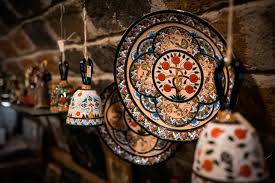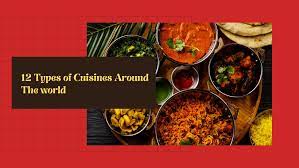Discovering the Authentic Charm of Armenia

The Charm of Authentic Armenia
Armenia, a land steeped in history and tradition, offers a glimpse into a world where authenticity reigns supreme. From its ancient monasteries perched on rugged mountains to its vibrant markets teeming with local produce, Armenia captivates visitors with its unfiltered charm.
One of the hallmarks of authentic Armenian culture is its rich culinary heritage. Traditional dishes like dolma, khorovats (barbecue), and lavash bread are not just meals but reflections of centuries-old recipes passed down through generations. The use of fresh, locally sourced ingredients adds a depth of flavour that is unique to Armenian cuisine.
Exploring the streets of Yerevan, Armenia’s capital city, reveals a blend of old-world architecture and modern influences. The bustling markets offer an array of handmade crafts, intricate carpets, and aromatic spices that showcase the country’s artisanal skills and cultural pride.
Venturing beyond the urban centres, visitors are greeted by the breathtaking landscapes that define Armenia. The serene Lake Sevan, surrounded by lush greenery and ancient churches, provides a tranquil retreat from the hustle and bustle of city life. Meanwhile, the rocky terrain of Garni Gorge offers a glimpse into Armenia’s geological wonders.
But perhaps what truly sets authentic Armenia apart is its warm and welcoming people. Armenians take pride in their hospitality, treating guests as honoured friends and sharing their stories with genuine warmth. Whether enjoying a traditional dance performance or partaking in a local festival, visitors are embraced as part of the community.
In essence, authentic Armenia is more than just a destination – it is an immersive experience that touches all the senses and leaves a lasting impression on those who have the privilege to explore its depths. It is a place where history meets modernity, tradition meets innovation, and beauty meets soul.
Exploring Authentic Armenia: A Guide to Cuisine, Culture, and Traditions
- What are some traditional Armenian dishes that I must try?
- How can I experience authentic Armenian culture during my visit?
- What are the top historical sites to visit in Armenia for an authentic experience?
- Are there any unique festivals or events that showcase Armenian traditions?
- How can I support local artisans and craftsmen in Armenia?
- What are some tips for interacting with locals and immersing myself in Armenian daily life?
What are some traditional Armenian dishes that I must try?
When exploring the culinary landscape of authentic Armenia, there are several traditional dishes that you simply must try. From the delectable dolma, a dish of minced meat and rice wrapped in grape leaves, to the succulent khorovats (barbecue) that showcases the art of Armenian grilling, each bite offers a taste of centuries-old recipes steeped in tradition. Don’t miss out on lavash bread, a soft and thin flatbread that serves as a staple in Armenian cuisine. These dishes not only satisfy the palate but also provide a window into the rich cultural heritage and culinary expertise that define Armenian gastronomy.
How can I experience authentic Armenian culture during my visit?
To truly experience authentic Armenian culture during your visit, immerse yourself in the local way of life by exploring traditional markets, sampling authentic Armenian cuisine at local eateries, and engaging with the friendly locals. Visit historical sites such as ancient monasteries and archaeological landmarks to gain insights into Armenia’s rich history and heritage. Attend cultural events, festivals, and performances to witness traditional music and dance firsthand. Consider staying in locally-owned guesthouses or homestays to connect with Armenian families and learn about their customs and traditions. By embracing these experiences and engaging with the community, you can create lasting memories of genuine Armenian culture during your visit.
What are the top historical sites to visit in Armenia for an authentic experience?
When seeking an authentic experience in Armenia, exploring its top historical sites is a must. From the ancient monasteries of Geghard and Tatev to the majestic ruins of Zvartnots Cathedral and the historical significance of Echmiadzin Cathedral, each site offers a glimpse into Armenia’s rich cultural heritage and architectural prowess. These landmarks not only showcase the country’s deep-rooted history but also provide visitors with a profound sense of connection to Armenia’s past, making them essential destinations for those seeking an authentic and immersive experience in this captivating country.
Are there any unique festivals or events that showcase Armenian traditions?
Armenia boasts a rich tapestry of unique festivals and events that serve as vibrant showcases of its deep-rooted traditions. One such event is the Vardavar festival, a joyous celebration where people douse each other with water to commemorate the transfiguration of Jesus Christ. Another notable festival is the Areni Wine Festival, which honours Armenia’s ancient winemaking heritage with tastings, music, and traditional dances. These colourful and lively gatherings not only offer a glimpse into Armenian customs but also embody the spirit of community and cultural pride that define authentic Armenia.
How can I support local artisans and craftsmen in Armenia?
Supporting local artisans and craftsmen in Armenia is a wonderful way to contribute to the preservation of the country’s rich cultural heritage. One of the most direct ways to support these talented individuals is by purchasing their handmade products, such as traditional ceramics, intricate textiles, or unique jewellery. By buying directly from local artisans or visiting artisan markets, you not only acquire one-of-a-kind pieces but also help sustain their craft and livelihood. Additionally, spreading awareness about Armenian craftsmanship through social media, word-of-mouth recommendations, or participating in community events that promote local artisans can further support their work and ensure that these age-old traditions continue to thrive for generations to come.
What are some tips for interacting with locals and immersing myself in Armenian daily life?
When seeking to immerse oneself in Armenian daily life and connect with locals authentically, it is beneficial to approach interactions with a genuine curiosity and respect for the culture. Engaging in conversations with locals, whether at markets, cafes, or cultural events, can offer valuable insights into Armenian traditions and way of life. Learning a few basic Armenian phrases can also go a long way in bridging language barriers and showing appreciation for the local language. Participating in community activities, such as traditional celebrations or volunteering opportunities, can provide a deeper understanding of Armenian customs and values. Ultimately, being open-minded, receptive to learning, and displaying genuine interest in the local customs will enhance the experience of immersing oneself in Armenian daily life.

